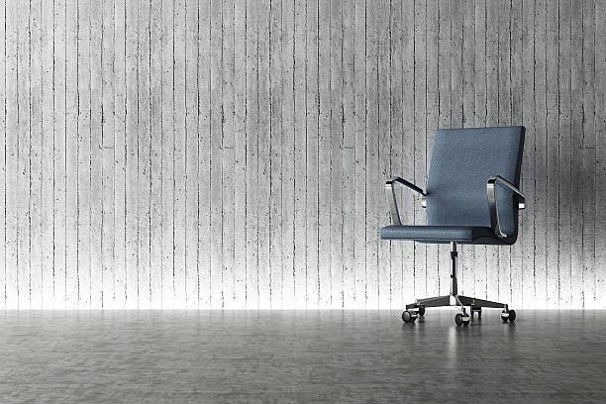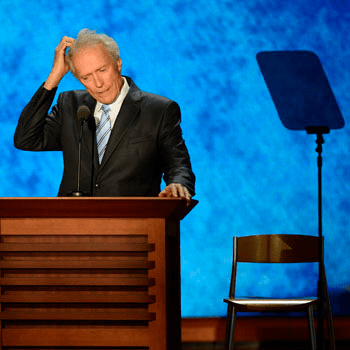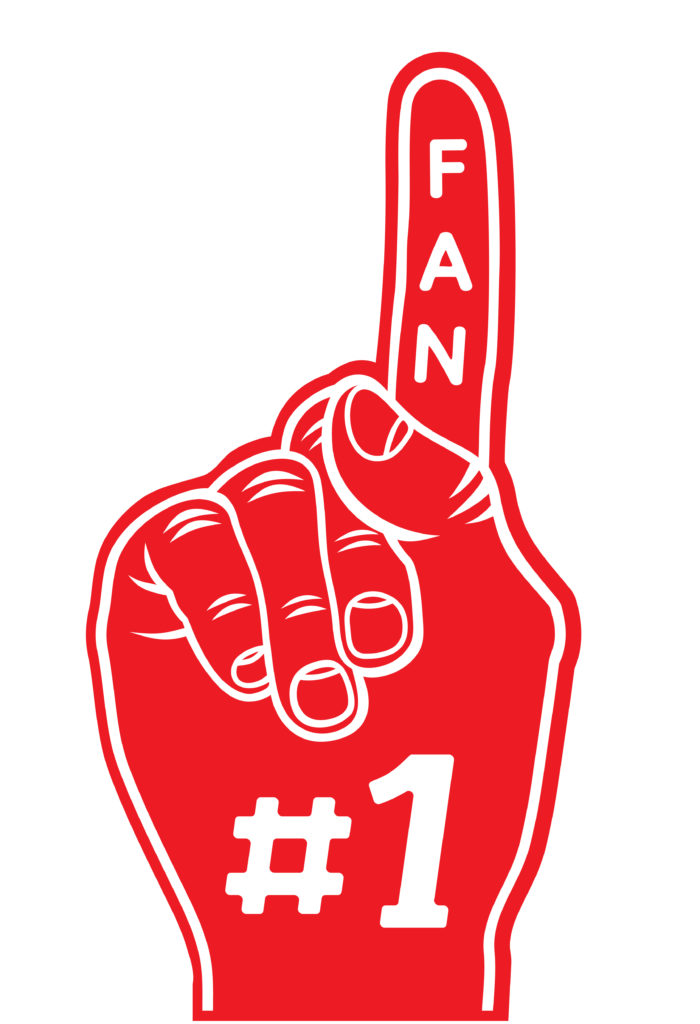
Remember that famous – or perhaps infamous scene at the 2012 Republican Convention. Veteran actor/director Clint Eastwood was tasked with the mission of trying to prevent Barack Obama from winning a second term.
Eastwood later admitted that making speeches isn’t part of his skill set. He explained, “I really don’t know how to…They’ve got this crazy actor who’s 82 years old up there in a suit.”
And it didn’t go well.
The chair was supposed to represent President Obama, and  Eastwood’s idea was apparently hatched just minutes before he took the stage. He really had nothing prepared. So, Eastwood spotted an empty chair to represent President Obama, and spontaneously decided to have a few words with the chief executive, and tell him a thing or two.
Eastwood’s idea was apparently hatched just minutes before he took the stage. He really had nothing prepared. So, Eastwood spotted an empty chair to represent President Obama, and spontaneously decided to have a few words with the chief executive, and tell him a thing or two.
The first reactions from the eventual nominee and his running mate – Mitt Romney and Paul Ryan – were enthusiastic. But the torrent of laughter and criticism on social media, and of course, the political pundits made it clear Eastwood’s chair stunt only worked with die-hard Republican party enthusiasts.
But the idea – having an empty chair represent someone of importance – was a good one. Perhaps Eastwood’s execution fell way short, but he actually had an interesting concept.
These days in the business world, hot marketing ideas and strategic concepts often take on a cult-like quality, especially when they’re turned into best-selling books, helping their authors make their way to corporate boardrooms, company retreats, and conferences.
Over the years, business gurus like Tom Peters, Ries & Trout, Seth Godin, Simon Sinek, and Gary Vaynerchuk have been engaged by corporations and conventions to share their ideologies and concepts.
Yes, some are fads. But there’s one concept that has taken flight over the past year, and we may have “Dirty Harry” to thank for it. Now popularized by Amazon’s Jeff Bezos, the idea is to use an empty chair in key meetings to represent the customer.
As John Koetsier, VP Insights of Singular, writes in Inc., Amazon’s focus on its consumer has become even more important as the company has exponentially exploded. He quotes CEO Jeff Bezos’ famous guiding mission:
“Start with the customer and work backwards.”
That’s precisely what Amazon has focused on these past two decades, as it has successfully moved from startup to behemoth.
The empty chair technique has permeated every key meeting in the company. As Amazon executives, consultants, analysts, and researchers gather around the conference table, that lone, unoccupied chair is  reserved for the customer.
reserved for the customer.
In that way, the trap that managers so often fall into – considering what’s good for the company, rather than the customer – is avoided by having that stark representation of a client, a user, or in radio’s case, a listener (or advertiser) literally have a seat at the table.
As radio execs have learned – oftentimes, the hard way – they aren’t just competing against one another anymore. They are now going up against the biggest media companies on the planet – Facebook, Google, Spotify, and of course, Amazon.
In order to compete, they have to understand the new arena they’re in. And as massive as these media/tech giants have become, their relentless focus on the customer has defined their strategies and even their missions.
Radio companies – and the stations they own – have traditionally designed audience research to learn about the popularity of songs and DJs. But rarely do they ask about the customer experience, much less the complaints listeners and advertisers have about a medium that has taken its competitive knocks in recent years.
So, that empty chair in the room is an effective way to hear from customers – even if you don’t always like what they’re “saying.” A story in AdAge details that journey with Pepsi, a perennial #2 brand that has grown tired of taking a back seat to Coke.
In their new campaign, Cardi B makes it clear that it’s “Okurrr” (her “OK”) to order a Pepsi – and not just think of it as a backup to Coca-Cola.
That might have been a tough truth for Pepsi execs to learn, but that’s how the process of listening to fans works. For the biggest companies, it goes beyond using data and metrics. It encompasses putting corporate executives in the shoes of their customers, making sure their voices are heard in every meeting.
As Todd Kaplan, Pepsi marketing VP, explains in AdAge’s Marketer’s Brief podcast, “Rather than start with your brand objective, start with what’s happening in culture by listening to the consumer, looking at cultural truths and insights, and saying, ‘OK, there is a thing that is bubbling up here.’ Start with that and then ladder up and say, ‘What would Pepsi’s point of view be on that?”
Radio needs to replicate that process. It is no longer the hot audio choice even though its reach is still impressive. Today, there are many, many options available to consumers so studying the insights from consumers has become important.
As a consultant, I’m paid to recognize ideas worth stealing – and the “empty chair” is one of them. Whether it’s at your next corporate retreat, budget forecast, or music meeting. That’s because broadcast radio has its own “cultural truths” to deal with – and maybe even embrace – rather than continuing to look at the industry’s challenges from the same dominant position radio held in the 80’s.
Tomorrow, we’ll look at how a small town sports team is putting Amazon’s “Fans First” idea into practice.
And no matter who you voted for back in 2012, think about Clint Eastwood’s on-stage visual metaphor as a way to refine your meeting structure in 2020 – and perhaps your entire way of thinking about your brand. And maybe even broadcast radio.
It’s time to learn about our “cultural truths.” And embrace them.
Just pull up a chair.
- Like A Pair Of Old Jeans - April 2, 2025
- What’s Fair Is Fair - April 1, 2025
- What’s On Your Bucket List? - March 31, 2025




Great Idea Fred, Thanks for sharing.
Appreciate it, Jay.
Ding! This is great, I echo Jay. Btw-Hi Jay.
Thanks, Slats.
Radio started focusing on empty chairs long before Clint Eastwood’s debacle – but those empty chairs have been because of mass firings, not the conceptual spirit of customers. How fitting as radio is in the midst of its annual 4th quarter firing binge, creating even more empty chairs.
Radio has devoted nearly all of its focus on consolidation and cost cutting for 25 years and you can trace its progressive TSL decline literally to the year duopoly was approved – long before ipods, Satellite radio, Pandora or Spotify. Maybe some of the empty chairs should be in the C-suites.
Bob, as always, thanks for helping us efficiently use the resources at hand – in this case, empty chairs. There are more and more of them every year.